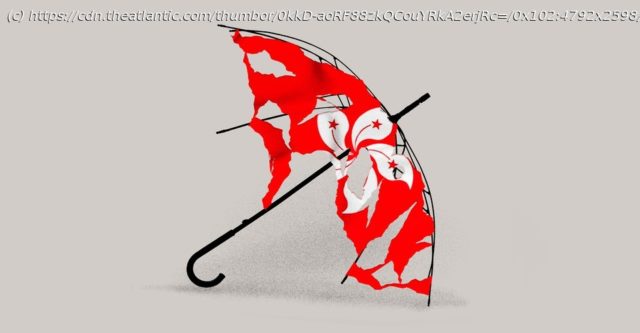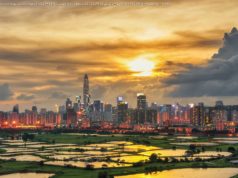The conviction of a pro-democracy activist is a watershed moment.
Liberate Hong Kong, revolution of our times. For 15 days this month, prosecutors and defense lawyers in a Hong Kong courtroom wrangled over the history and parsed words in this phrase. The back-and-forth included numerous forays into the obscure in an attempt to pinpoint the exact meaning of the slogan, created five years ago and popularized during 2019’s pro-democracy protests. There were diversions into ancient Chinese history and poetry; the former nationalist leader Chiang Kai-shek made a cameo, as did the American civil-rights leader Malcolm X. The crux of the argument: Could these seven words transform a dangerous-driving incident more than a year ago into an act of terrorism and secession? Today, a panel of judges said emphatically that they could and they had. It found Tong Ying-kit, the first person to face trial under the national-security law imposed by Beijing last year, guilty of terrorism and inciting secession. The motorcycle that Tong, a 24-year-old former waiter, was driving crashed into riot police on July 1, 2020, during a demonstration against the national-security law. A black flag bearing the popular protest mantra flew off the back of his bike when the crash occurred. Tong’s actions caused “great harm to society,” Esther Toh, one of the judges hearing the case, told the court. The protest banner attached to his motorcycle was intended “to incite others to commit secession by separating” Hong Kong from mainland China, according to the judges’ ruling. Tong will be sentenced at a later date. He faces the possibility of life in prison. The ruling is one of the most significant in Hong Kong’s recent history, criminalizing one of the most popular slogans from the pro-democracy protests that swept across the city in 2019. It sets a precedent that the mere uttering of any phrase or singing of any song that irks the government can now be deemed as among the most grievous of crimes in Hong Kong—a precedent that can, and most likely will, be used against the dozens of government critics sitting in the city’s jails, awaiting their day in court for allegedly violating the security law. The verdict “simply marks the end of free speech in Hong Kong, as a pure expression of politically dissenting opinion can be punished for inciting secession,” Eric Yan-ho Lai, the Hong Kong law fellow at the Georgetown Center for Asian Law, told me shortly after the verdict was announced. “Undoubtedly, the verdict aligns with the government narratives on the slogan and thus criminalized anti-government speech.” Tong’s conviction is just the latest development, and one of the most serious, in an unrelenting campaign by Beijing and its loyalists in Hong Kong to stamp out the faintest inkling of dissent in the city. Even before the verdict was handed down, “Tong’s case set a dangerous precedent,” Lai said.






